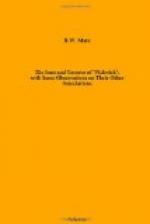As Mr. Pickwick contemplated staying in Bath for at least two months, he deemed it advisable to take lodgings for himself and his friends for that period. This he did, and the “White Hart” has no further association with his person during his stay in the gay city.
The “White Hart,” nevertheless, has a very strong claim to Pickwickian fame, apart from the brief fact that the founder of the club stayed there a night or two. At the time, the “White Hart” belonged to the very Moses Pickwick whose name on the coach so worried poor Sam Weller at the start of their journey down from London.
[illustration: The “White Hart,” Bath. From an engraving]
This Moses Pickwick was a grandson of Eleazer Pickwick, who, it is recorded, was a foundling. The story told concerning him is that when an infant he was picked up by a lady in the village of Wick near Bath, carried to her home, adopted and educated. Hence, according to some, the name Pick-Wick. There is, however, a village near to hand actually called “Pickwick,” which may also have inspired the name for the foundling.
For some reasons unknown, or, at any rate, unrevealed, this foundling developed a craze for the coaching business, and, ultimately, taking service in one of the coaching inns, devoted his time and interests whole-heartedly to the profession, or calling. Eventually he became the owner of the business.
His grandson, Moses, became even more famous during the coaching era than his foundling antecedent, and at the time Pickwick was written he was the actual proprietor of the White Hart Hotel, as well as of the coaches which ran to and from it. He became, also, the most popular owner in the trade, and retired to the village of Upper Swanswick a rich man. We believe the name is still perpetuated in the neighbourhood.
Now it is known as a fact that Dickens took the name Pickwick from the said Moses Pickwick the proprietor of the “White Hart,” whose coaches he had seen and ridden in a year or two previously. So that apart from the brief references to the inn in The Pickwick Papers its history is very much associated with the book.
Unfortunately, Dickens does not give us any minute description of it, as he does of other inns. Although it was the most important coaching house in the city, it could not be spoken of as particularly attractive in appearance. It looked more like a barracks than an hotel, indeed, we believe it was used for such a purpose in its degenerate days before it was finally demolished in 1867.
During its prosperous era, it was the resort of all the distinguished visitors who flocked to Bath during those gay and festive times.
There is still a relic of it in existence. The gracefully carved effigy of a white hart, which decorated the front of the building, now serves a similar purpose on an inn with the same name in the suburb of Widcombe, near by. On the site of the old house now stands the Grand Pump Room Hotel.




